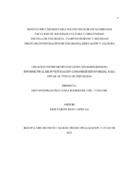Mostrar el registro sencillo del ítem
Creación instrumento encuesta neurodiversidad
| dc.contributor.advisor | Rico Castillo, Erik Fabian | |
| dc.contributor.author | Daza Rodriguez, Giovanni Francisco | |
| dc.coverage.spatial | Bogotá D.C. | |
| dc.date.accessioned | 2023-11-28T00:36:26Z | |
| dc.date.available | 2023-11-28T00:36:26Z | |
| dc.date.issued | 2023-07-13 | |
| dc.identifier.uri | http://hdl.handle.net/10823/7034 | |
| dc.description.abstract | En el mercado laboral se ubican infinidad de personas con múltiples características, y muchas veces por procesos de selección mecánicos y repetitivos no se logran identificar sus características diferenciales, luego una vez vinculados no ejecutan un cargo efectivamente, cabe resaltar que para Colombia la tasa global de participación fue de 63,9% según el DANE en el mes de mayo lo que es esencial para proponer espacios y estrategias diferentes contemplando poblaciones que previamente no se tenían en cuenta. En el año 2006, la Asamblea General de las Naciones Unidas aprobó la Convención sobre los Derechos de las Personas con Discapacidad. Como fruto de dicha convención, los países firmantes, han adoptado su legislación interna en aras de lograr su cumplimiento. Así lo ha hecho Colombia, a partir del año 2007, por lo anterior, la Convención ha obligado al Estado Colombiano la expedición y aplicación de normas en protección de las personas con discapacidades, lo cual ha incluido a quienes sean “Neurodiversas”. No existe una legislación específica que establezca condiciones de acceso al trabajo, por lo que la mayoría de la legislación aplicable es aquella destinada a las personas en condición de discapacidad en general. Este proyecto, por tanto, busca caracterizarlas por sus rasgos específicos de comportamiento y lograr direccionar mejores procesos de ajustelaboral en sus respectivas áreas de desempeño. | spa |
| dc.format.mimetype | application/pdf | spa |
| dc.language.iso | spa | spa |
| dc.title | Creación instrumento encuesta neurodiversidad | spa |
| dc.type | bachelorThesis | spa |
| dc.type.local | Tesis/Trabajo de grado - Monografía - Pregrado | spa |
| dc.type.driver | info:eu-repo/semantics/bachelorThesis | spa |
| dc.title.translated | Creation of neurodiversity survey instrument | spa |
| dc.subject.proposal | Neuro diversa | spa |
| dc.subject.proposal | Neurotípico | spa |
| dc.subject.proposal | Neurodivergente | spa |
| dc.subject.lemb | Discapacidad física | spa |
| dc.subject.lemb | Mercado laboral | spa |
| dc.subject.lemb | Neurociencia cognitiva | spa |
| dc.description.abstractenglish | In the labor market there are countless people with multiple characteristics, and many times due to mechanical and repetitive selection processes it is not possible to identify their differential characteristics, then once they are linked they do not effectively carry out a position. It is worth highlighting that for Colombia the global Participation was 63.9% according to DANE in the month of May, which is essential to propose different spaces and strategies considering populations that were previously not taken into account. 2006, the United Nations General Assembly approved the Convention on the Rights of Persons with Disabilities. As a result of this convention, the signatory countries have adopted their internal legislation in order to achieve its compliance. This is what Colombia has done, starting in 2007, due to the above, the Convention has obligated the Colombian State to issue and apply standards to protect people with disabilities, which has included those who are “Neurodiverse.” There is no specific legislation that establishes conditions of access to work, so the majority of the applicable legislation is that intended for people with disabilities in general. This project, therefore, seeks to characterize them by their specific behavioral traits and manage to direct better work adjustment processes in their respective areas of performance. | spa |
| dc.subject.keywords | Neuro diverse | spa |
| dc.subject.keywords | Neurotípico | spa |
| dc.subject.keywords | neurodivergent | spa |
| dc.relation.references | Espacio autismo (19 diciembre 2021),” ¿Qué significa ser una PERSONA NEUROTÍPICA?, https://www.espacioautismo.com/que-significa-ser-una-personaneurotipica/ | spa |
| dc.relation.references | Neurodoza (22 agosto 2022), “¿Qué es la neurodiversidad y la neurodivergencia?, https://neurodoza.com/que-es-la-neurodiversidad-y-la-neurodivergencia/ | spa |
| dc.relation.references | Mundo psicólogos (19 enero 2022), “¿Qué es ser neurodivergente o neurotípico? Tipos de neurodiversidad”, https://www.mundopsicologos.com/articulos/que-es-serneurodivergente-o-neurotipico-tipos-de-neurodiversidad | spa |
| dc.relation.references | Miller Caroline (9 enero 2023), “¿Qué es la neurodiversidad?”, https://childmind.org/es/articulo/que-es-la-neurodiversidad/ | spa |
| dc.publisher.program | Psicología - Virtual | spa |
| dc.type.coar | http://purl.org/coar/resource_type/c_7a1f | spa |
| dc.publisher.faculty | Facultad de Sociedad, Cultura y Creatividads | spa |
| dc.identifier.instname | instname:Politécnico Grancolombiano | spa |
| dc.identifier.reponame | reponame:Alejandría Repositorio Comunidad | spa |
| dc.type.hasversion | info:eu-repo/semantics/acceptedVersion | |
| dc.rights.accessrights | info:eu-repo/semantics/openAccess | |
| dc.identifier.repourl | repourl:http://alejandria.poligran.edu.co | spa |
| dc.type.redcol | https://purl.org/redcol/resource_type/TP | |
| dc.rights.creativecommons | Atribución-NoComercial-SinDerivadas 2.5 Colombia | spa |
| dc.type.version | info:eu-repo/semantics/draft | spa |
| dc.type.coarversion | http://purl.org/coar/version/c_b1a7d7d4d402bcce | spa |
Ficheros en el ítem
Este ítem aparece en la(s) siguiente(s) colección(ones)
-
Psicología - Virtual [557]

